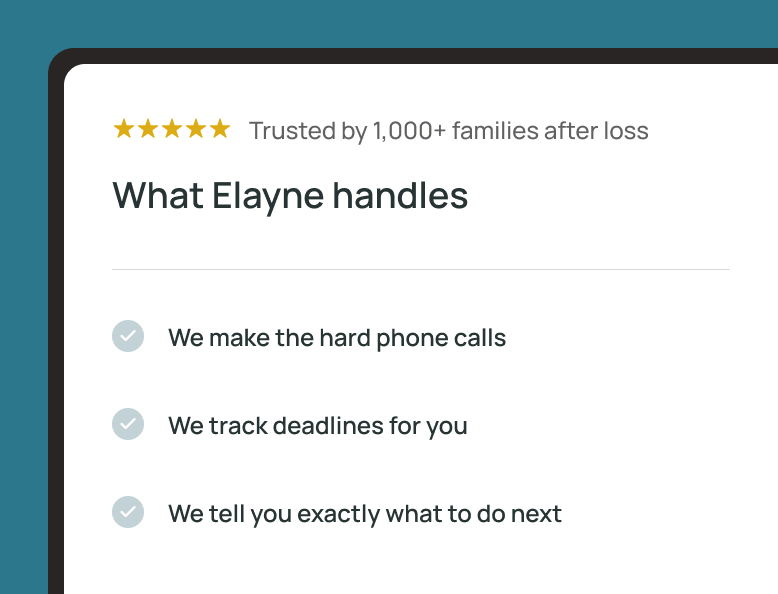When a loved one passes away, their financial matters often become a complex web to unravel. If you’re the executor of their estate or a close family member trying to handle affairs, one of your first questions might be: Do bank accounts with named beneficiaries have to go through probate?
The good news is, in most cases, the answer is no—but the details matter.
What is probate?
Probate is the legal process through which a deceased person’s estate is settled. This process involves:
- Validating the deceased's will (if one exists),
- Identifying and inventorying the person’s assets,
- Paying any debts or taxes owed, and
- Distributing the remaining assets to next of kin or beneficiaries.
The probate process can vary depending on state laws, the size of the estate, and whether there is a will. It can take anywhere from a few months to over a year and may involve court appearances, legal fees, and detailed financial accounting.
Which assets go through probate after someone dies?
Not all assets must go through probate. Generally, only those that are solely owned by the deceased without a named beneficiary or co-owner are subject to probate. Common examples include:
- Real estate titled solely in the deceased’s name,
- Personal property such as jewelry or vehicles,
- Bank accounts without a joint owner or named beneficiary,
- Investment accounts not held in a trust or lacking a transfer-on-death (TOD) designation.
On the other hand, assets that typically bypass probate include:
- Jointly owned property (with rights of survivorship),
- Life insurance policies with named beneficiaries,
- Retirement accounts like IRAs or 401(k)s with named beneficiaries,
- Bank accounts with payable-on-death (POD) designations.
How bank accounts with beneficiaries are handled after someone dies
A bank account with a named beneficiary is commonly known as a Payable-on-Death (POD) or Transfer-on-Death (TOD) account. These designations allow the account holder to name a person (or multiple people) who will inherit the funds upon their death.
Here’s how it typically works:
- Account Holder Passes Away: The financial institution is notified of the death, usually by presenting a certified death certificate.
- Beneficiary Presents Documentation: The named beneficiary provides proof of identity and completes any required claim forms.
- Funds Are Released: The funds are transferred directly to the beneficiary, and the account is closed.
Since the funds are legally transferred outside of the will and estate, this process avoids probate entirely.
When bank accounts do go through probate after someone dies
Even if a bank account had a beneficiary designation, there are some scenarios where probate may still be necessary:
- No Beneficiary Is Named: If the account was not set up as POD or TOD, and the deceased was the sole owner, the account will likely go through probate.
- Beneficiary Predeceased the Account Holder: If the named beneficiary passed away before the account holder and no alternate was named, the account becomes part of the estate.
- Disputes or Legal Challenges: If other heirs contest the designation, or if there are allegations of fraud or undue influence, the court may freeze the account and include it in probate proceedings.
- Multiple Beneficiaries with No Clear Instructions: If the designation is unclear or poorly documented, the bank may require court guidance before releasing funds.
- Small Estate Without Planning: In cases where an individual did no estate planning and had multiple sole-owned accounts with no beneficiaries, those assets will all need to be probated.
Advantages of naming beneficiaries on bank accounts
Designating a beneficiary on your bank account is one of the simplest ways to streamline your estate and spare loved ones the hassle of court involvement. Benefits include:
- Speed: Funds are typically available to the beneficiary within a few weeks of submitting paperwork.
- Cost Savings: No legal or court fees are involved for that account.
- Privacy: Probate records are public; avoiding probate keeps financial matters more private.
- Simplicity: It reduces the burden on the executor and minimizes administrative steps.
How to add a beneficiary to your bank account
If you're thinking ahead and want to spare your loved ones from probate, it’s easy to add a beneficiary to your account:
- Contact your bank and ask about setting up a Payable-on-Death (POD) designation.
- Provide the full legal name and information of your chosen beneficiary.
- Complete any required paperwork. In most cases, this can be done in person or online.
- Keep your beneficiary information up to date, especially after major life events like a divorce, death, or birth of a new child.
Bank accounts with properly designated beneficiaries do not go through probate in most cases. This small but powerful estate planning step can make a big difference for your loved ones during a difficult time. However, like any financial plan, it’s important to ensure your designations are clear, up-to-date, and coordinated with your overall estate strategy.
If you’re managing a loved one’s estate after a death and unsure about how an account is set up, it’s wise to contact the bank directly and consult with a professional. And if you’re planning ahead for your own future, now is the time to review your account beneficiaries—you’ll be doing your next of kin a real favor.
The team at Elayne can help clarify this process, as well as other steps in the estate planning process.












































